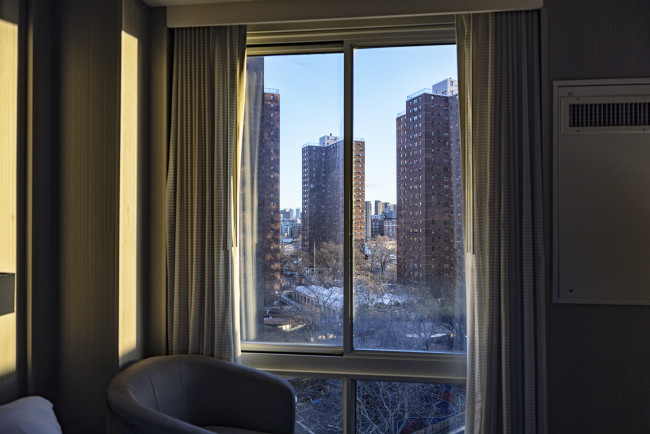How to warm up your chilly NYC apartment: Brick Underground's best advice
- Landlords must keep units at 68 degrees minimum during the day if the temperature outside dips below 55
- Kerosene and propane space heaters are prohibited in NYC; use electric space heaters with caution

If you have no heat, you may be entitled to a rent abatement.
iStock
It's fall and if you live in New York City, there is a chance you can be just as cold inside your apartment as you are outside. Or maybe you have too much of a good thing—your radiators are on blast and you feel like you live in a tropical locale.
Whether you rent or own, when it comes to heat in your NYC apartment, there very often is no happy medium. Brick Underground has got you covered with our best advice on what to do if your apartment is not warm enough.
We also have advice for specific scenarios, for example, the new landlord of your rent-stabilized apartment wants to switch your heat to a more expensive system, if you're unclear who pays for heat, and what happens if you withhold rent because of a lack of heat.
Read on for some advice about staying warm in your NYC apartment.
[Editor's note: A previous version of this post was published in November 2023. We are presenting it again with updated information for November 2025.]
Heating your NYC apartment 101
During the city’s "heat season," which started Oct. 1st, your landlord is obligated to keep your apartment at least 68 degrees between 6 a.m. and 10 p.m. if the outside temperature dips below 55 degrees. At night, your apartment must be at least 62 degrees, regardless of what the thermometer says outside.
If you don’t have heat, you should first contact your building super, manager or owner to let them know. If you don’t get a response or resolution, you can call 311, submit a complaint online, or use the app 311Mobile. Hearing-impaired tenants can register complaints via a Touchtone Device for the Deaf at (212) 504-4115. Filing a complaint can get the Department of Housing Preservation and Development involved. call 311, which should alert the Department of Housing Preservation and Development. Getting HPD involved can include a site visit—and a hefty fine for your landlord.
Get to know your radiator
If you live in an older building, you likely have one or more hulking—and noisy!—radiators occupying prime real estate in your apartment, but what do you really know about your NYC radiators? For starters, you should know the circular knob is not, in fact, used to regulate the temperature, but serves as an on-off switch.
Want to get a comprehensive report on the potential issues with a building before you rent or buy it? Run the address through the Brick Report and get a real estate background check built from all of New York City's Open Data in one place. Brought to you by Brick Underground.
Some hissing and knocking sounds are normal, but excessive banging signs are a sign you may need to bleed your hot water-heated radiator. This isn't something you should do yourself, at least not the first time—you need to reach out to your super.
While these clunky heat givers are so very New York, some find them an eyesore or inconveniently located. If you’re in that category, a lot of companies make radiator covers that not only hide them without hindering their heat, but also turn them into a functional part of your décor.
I’m still cold in my NYC apartment. What can I do?
If your apartment heat is on, but you’re still cold, you have a few options beyond adding more layers, sealing drafts, and burying yourself in blankets, but one of them is most definitely not using your oven or gas range. You risk creating dangerous levels of carbon monoxide, which can cause severe illness and possible death.
Do not use a kerosene or propane space heater, which are illegal and strictly prohibited in NYC. Electric space heaters, however, are allowed, but should never be used with an extension cord. Look for electric space heaters with an automatic shut-off feature, and only use ones that have the Underwriters Laboratories (UL) mark. You should also inspect the cord for damage before each use.
Electric space heaters should be kept away from children and pets, and be at least three feet from combustible material such as bedding or furniture. They should not be used in bathrooms or other places they could come in contact with water. Be sure to turn off and unplug the heater when you go to bed or leave the room. Note: Space heaters do not satisfy your landlord’s legal obligation to provide heat.
If you’re thinking of using an electric blanket, it, too, should have an auto shut-off feature and the UL Mark. If it’s more than 10-years-old, it should be replaced, as should blankets with frayed or broken cords or scorch marks. Never tuck the blanket into the side of the bed or cover with other bedding while in use.
Check to make sure windows are completely closed: Older windows sometimes slid down from the top, leaving a small gap that lets cold air in. Make sure the gap is closed and lock the window to keep it in place.
You might feel reluctant to spend money on window treatments for a rental, but they do much more than add decor. Heavy thermal curtains block drafts and keep the heat in when you keep them closed. Adding window insulation can also help and for cold air seeping under your front door, adhesive door sweeps or draft blockers are inexpensive fixes.
The heat's on, but now I’m too hot!
If your heat is on, but you’re too hot, opening a window is the first thing you might want to do, but it's a terrible waste of energy. Why not try getting the owner to lower the heat instead or improve the way heat is distributed around the building?
A NYC tenant wrote to Brick about an apartment that is consistently over 80 degrees since the owner turned on the heat in October. Our experts advise the reader to organize other tenants, who are suffering as well, to form a tenants association to address the landlord as a group.
You can read more suggestions about what to do when you apartment is too hot: "The heat is blasting in my apartment. What can I do?"
Does no heat equal a rent discount?
If you have no heat, whether due to a broken boiler or another factor that’s out of your hands, you may be entitled to a rent abatement for that time period.
Failing to provide heat during the cold weather months is considered a breach of the warranty of habitability. For more, read: "What is the warranty of habitability?"
Automatically withholding rent can land you in housing court, so first try to negotiate an abatement with your landlord and be sure to get it in writing.
If your landlord does sue you for non-payment and tries to evict you, according to Altagracia Pierre-Outerbridge, attorney and founder of Outerbridge Law (and a Brick sponsor): “You have a defense, which is a lack of heat, but you still cannot ignore a notice of eviction—you need to go to court and explain the situation—or you will lose the case. Check out: "Ask Altagracia: I withheld rent due to inadequate heat and I'm being hassled to pay it back. What should I do?"
Overhauling your heating system
If you’re an owner, upgrading your HVAC, or heating, ventilation and air conditioning system, in your NYC apartment could be a worthy renovation. Not only could it mean ending that yearly hassle of installing, removing and storing in-window air conditioners, it also could save you from fighting over the thermostat season after season—and be more efficient and quieter, too.
Such an undertaking, however, is dependent on several factors, from the age, landmark status, and board rules of your building to its electrical capacity, ceiling height, and where construction will take place in your apartment compared to the apartment below you. As with any type of renovation, consult with your building management and board before starting the project.
—Earlier versions of this article contained reporting and writing by Nikki M. Mascali.
You Might Also Like



























